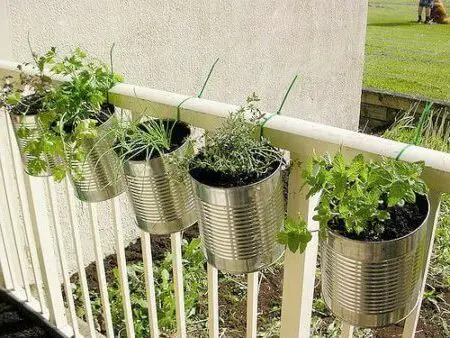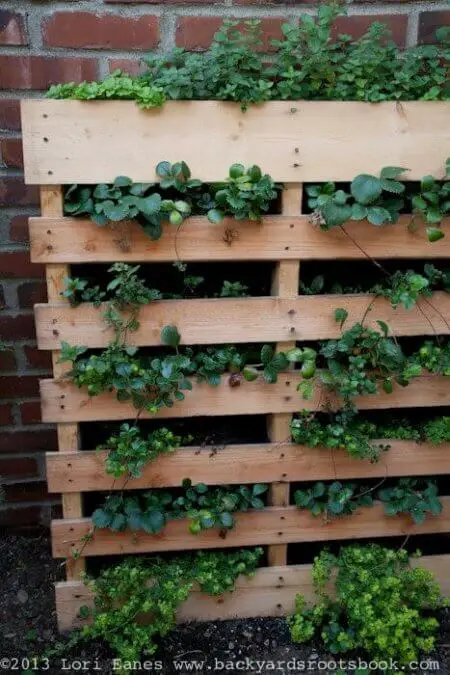Growing a garden is a great way of supplementing food stores with something sustainable year after year.
Urban container gardening is growing plants in containers rather than in the ground. Urban areas normally have very few plots suitable for gardening, so growing plants in containers allow those in the city to grow plants indoors and in other areas.
Not only will you be providing healthy food options for your family, but you will also be learning to pay attention to your environment while learning a skill that has been keeping people alive for eons! Just a few great urban gardening container ideas will get you started!
The Field Guide to Urban Gardening has a ton of info to get you started with gardening in the city!
Where and what you grow will vary greatly upon the region you live in but also the exact setup of your residence. If all you have is an apartment, you may only have a few windows or a balcony if you are lucky. If you are in a slightly more open area, you may have a patio or small yard. Either way, container gardening is about maximizing your use of space.
There are urban gardening container ideas for everyone in every situation! All it takes is a little ingenuity and creativity; you can start a garden just about anywhere.

Small Space Gardens
Don’t overlook the tried and true window box garden! The size will be your enemy, but you can grow an amazing amount in a small space if you provide good soil and proper care. Any small container that is at least 5″ deep will provide you with the ability to grow food.
Cut-off pop bottles, old soup cans, small flower pots, and even old rubber boots make great pots! The trick is knowing what to grow.
For very small pots less than 6″ deep, you can grow a variety of small vegetables and pretty much any herb. Just remember to provide drainage for excess water. Try growing lettuce and other salad greens, radishes, green onions, and garlic.
The mighty #10 can is a great option for a midsized planter. Poke a few holes in the bottom for drainage and put in a good compost mix, and you are off! It’s amazing what you can grow in a #10 bush beans, pearl onions, peas, carrots, chard, peppers, and spinach, or add a small lattice and try tomatoes and pole beans.
Pots greater than a foot in depth will be about the maximum that most people can handle in a window garden. These pots open up the world of cole crops like cabbage, broccoli, cauliflower, kale, and brussels sprouts, in addition to potatoes, yams, sweet potatoes, okra, beets, and squash.
Small usually means limitations; though you are limited, there is great diversity in what you can grow. Because of soil mass, soil quality is vital, and ensuring enough water and nutrients will be the primary concern. Also, be mindful that not all crops grow well together.
Avoid planting these crops together:
- Beans with onions and garlic
- Tomatoes or squash with potatoes
- Onions with beans and peas

Medium Space Gardens
If you have a sizable balcony, front porch, or back patio, you have numerous options on what to grow and can provide a large portion of the vegetable needs of a small family. You can always use the small pot options and plant more density or use larger pots to increase your options.
Your options for larger containers are as plentiful as small containers. Premanufactured planters are a good option for a less conspicuous look, but you can always add steel tubs, DIY wooden boxes, tires, or cut-off plastic drums.
With the added soil mass, you can now grow most vegetables and some fruits. All of your berry bushes are available at soil depths of 12″. Watch blueberries, as they need very specific conditions, but blackberries, strawberries, melons, eggplant, and pumpkin will grow well.
In containers greater than 12″ deep and with decent amounts of soil, the staple crops of corn and beans can be easily grown. Potatoes are a good option for containers with enough room for them to grow, and without the hard-packed ground in most fields, they will be easy to harvest.
In addition to those listed above, don’t combine:
- Blueberries with other crops
- Potatoes with tomatoes, pumpkins, squash, radishes, or cucumbers
- Beans with beets
Large Space Gardens
If you have a sizable yard, you can produce anything a large farm does in limited amounts. Depending on your arrangement, having adequate sun may be your biggest issue. Plant in the ground if you choose, but some zoning may limit your ability to grow crops. Read over any zoning laws, as containers are often overlooked.
If you choose a container, the raised bed is king! Generally, a 4′ x 8′ wooden frame between 12″ and 18″ deep allows you to grow a larger variety and decent quantity. With a few of these, you can provide most, if not all, of your vegetable needs. A raised bed planted with corn can yield between 80 and 100 ears a year.
Larger pots measuring 2′ across by 20″ deep can support large berry bushes and even some dwarf fruit tree varieties. Add a trellis to grow grapes. Lemon trees are surprisingly easy to grow in pots this size.
Smaller crops like those listed above can be grown in lengths of gutter attached to a privacy fence or the back wall of a home for a cheap DIY option. These work great for salad greens and cole crops often victimized by small animals. With a drip irrigation system and some cleverly placed holes, you can water the whole garden easily with drip irrigation.
I am sure everyone can come up with their own urban container gardening ideas and, with just a little guidance, produce some crops no matter how little space is available. As long as you use nutrient-rich soil, provide plenty of water, and place them where there is plenty of sun, your crops should thrive no matter what container you choose. I know a man who grows flowers in a discarded toilet. If you can do that, you can do anything.
Conclusion
Urban container gardening is a great way to use leftover objects and take advantage of space that isn’t normally used in your house or apartment. It also gives you access to fresh fruits and vegetables that you don’t have to pay for.
Even if you don’t get into container gardening right now, it’s a good skill to have in an emergency!

